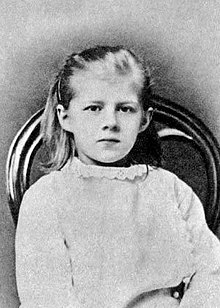Lyubov Dostoevskaya
Lyubov Dostoevskaya | |
|---|---|
 Lyubov Dostoevskaya as a child in the 1870s | |
| Native name | Любовь Достоевская |
| Born | Lyubov Fyodorovna Dostoevskaya 14 September 1869 Dresden, Germany |
| Died | 10 November 1926 (aged 57) Gries, Bolzano, Italy |
| Occupation | Writer |
| Nationality | Russian |
| Notable works | Dostoyevsky According to His Daughter (1920) |
| Parents | |
Lyubov Fyodorovna Dostoevskaya (Russian: Любо́вь Фёдоровна Достое́вская; 14 September 1869 – 10 November 1926), also known by the name Aimée Dostoyevskaya, was a Russian writer,[1] memoirist, and the second daughter of famous writer Fyodor Dostoevsky and his wife Anna. Their first, Sonya, was born in 1868 and died the same year.
Lyubov never married. Later in her life she became estranged from her mother and moved out of their house.[2] In 1913, after a trip abroad for medical treatment, Lyubov decided to stay there, and she lived abroad until her death in 1926.[2] At that period she was also known by the name Aimée Dostoyevskaya (Russian: Эме Достоевская).[3] She died in Italy of pernicious anemia.[3]

Although Lyubov Dostoevskaya was Orthodox, the funeral rite was Catholic by mistake.[4] A simple wooden cross on her grave was soon replaced by a small porphyry tomb. In 1931 Italia Letteraria magazine suggested that since Dostoevskaya was buried in Italy, it was the Italian government that should establish a memorial.[4] In December 1931 a granite pedestal was constructed, with an epitaph written by the editor of Venezia Tridentina magazine.[4] Resting place of Fyodor Dostoevsky's daughter in Gries has been preserved after cemetery reconstruction.[3] Her tomb was moved to Bolzano city's cemetery in 1957.
Works[edit]

Lyubov Dostoevskaya is best known for the book Dostoyevsky as Portrayed by His Daughter (German: Dostoejewski geschildert von seiner Tochter, also known as Dostoyevsky According to His Daughter), originally published in Munich in 1920.[2] Her memoirs, written in French and published in German, were later translated into other European languages.[5] In 1920 the book was released in Dutch (in Arnhem), the following year there were translations into Swedish and English, and in 1922 it was published in the United States and Italy.[6] A Russian version, highly abridged, was published in 1922 by Gosudarstvennoe Izdatelstvo (Saint Petersburg) under the title "Достоевский в изображении его дочери Л. Достоевской".[7]
The work contains many factual inaccuracies, partly because Lyubov was only 11 at the time of her father's death, and partly because she based the memoirs on her mother's stories.[8][9][10] Many researchers tend to see this memoir as subjective and unreliable, citing as an example her bias in the description of the relationship between Dostoevsky and his first wife, Mariya Isayeva.[4] Both Lyubov and her mother Anna expressed hatred towards Isayeva.[10]
Her other works include the short story collection Bolnye devushki (Russian: Больные девушки; 1911), and the novels Emigrantka (Эмигрантка; 1912) and Advokatka (Адвокатка; 1913).
English translations[edit]
- The Emigrant, (Novel), Constable and Co, London, 1916. from Archive.org
- Fyodor Dostoyevsky: A Study, Yale University Press, 1922. from Archive.org
References[edit]
- ^ Shadursky, Julia (1 June 2006). "Dostoevsky: Into the Depths of the Human Soul". NevaNews. Archived from the original on 26 November 2010. Retrieved 5 October 2010.
- ^ a b c Lantz, Kenneth (2004). The Dostoevsky Encyclopedia. Greenwood Publishing Group. p. 103. ISBN 0-313-30384-3.
- ^ a b c Kazakov, Alexey (31 August 2000). "Lyubov Dostoyevskaya: confessions album. A unique book about the daughter of the great Russian writer was published in Italy" [Любовь Достоевская: альбом признаний Уникальная книга о дочери великого русского писателя издана в Италии на трех языках] (in Russian). Chelyabinskiy Rabochiy. Archived from the original on 16 July 2011. Retrieved 5 October 2010.
- ^ a b c d Scanta, Olivia. "From Bolzano with love. The fate of Fyodor Dostoyevsky's daughter in Italy" [С любовью из Больцано. О судьбе дочери Ф.М.Достоевского в Италии] (in Russian). Russkoye Voskreseniye. Archived from the original on 3 March 2016. Retrieved 6 October 2010.
- ^ "Dostoevsky According to His Daughter" (in Russian). Gramota.ru. Retrieved 4 October 2010.
- ^ "Russian life. An exhibition dedicated to the 500th anniversary of Dostoevsky family" [Русская жизнь. Выставка к 500-летию рода Достоевских] (in Russian). Hrono.info. Retrieved 5 October 2010.
- ^ "Dostoevsky According to His Daughter L. Dostoyevskaya" [Достоевский в изображении его дочери Л. Достоевской] (in Russian). Ozon.ru. Retrieved 4 October 2010.
- ^ Catteau, Jacques (1989). Dostoyevsky and the process of literary creation. Cambridge University Press. p. 467.
- ^ Carr, E (1930). "Was Dostoyevsky an Epileptic?". The Slavonic and East European Review. UCL School of Slavonic and East European Studies.
- ^ a b http://golosasibiri.narod.ru/downloads/kuz_ven_dost_1.pdf [bare URL PDF]


 French
French Deutsch
Deutsch